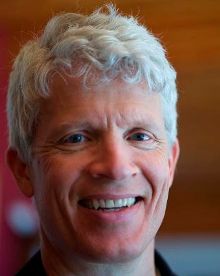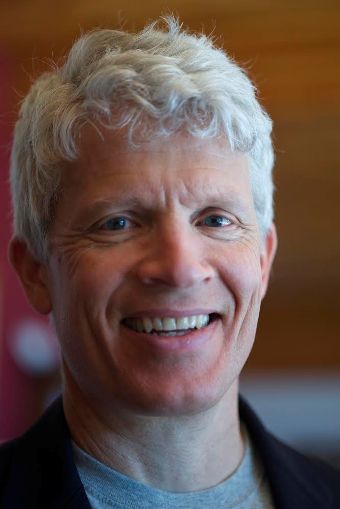Wednesday, Oct 22 at 6 p.m.at Emmanuel Church Paris Hall; reception and book signing immediately afterwards at Darvills Bookstore in Eastsound
— by Margie Doyle —
Paul Roberts, journalist and author, will return to Orcas Island, where he grew up, to speak to islanders about his latest book, The Impulse Society: America in the Age of Instant Gratification.
The Impulse Society follows Roberts’ books investigating large-scale industries: energy The End of Oil (2004); and food The End of Food (2008). Roberts was lauded by such experts in the fields as environmentalist Bill McKibben and professor Michael Pollan for these books.
During an interview with Orcas Issues, Roberts said that in researching and analyzing large, industrial systems he came to understand “how business operates and consumers buy in without knowing.”
The industry outreach is geared to “focus closer and closer to the consumer; to match the product to [consumer] preference… at some point, to get in your head,” Roberts says.
Roberts’ editor suggested that the patterns he investigated for food and energy could be applied to economics in general: thus, the “impulse” for The Impulse Society.
“The consumer marketplace effectively moved inside the self, and is now inseparable from not only our desires and decisions, but also our very identities,” he writes in The Impulse Society.
The Sydney (Australia) Morning Herald reported, “This unprecedented power to shape our identities at an individual level, says Roberts, leaves us unable to make sacrifices for the common good. The Impulse Society is a compelling analysis of an unprecedented economic phenomenon and its psychological and social consequences.” ( smh.com.au/books/Impulse-Society )
Roberts will give his talk at 6 p.m. on Wednesday, Oct. 22 at the Emmanuel Episcopal Parish Hall, and a reception and book signing will follow at Darvill’s Bookstore. Jenny Pederson, Darvill’s owner says, “We’re really excited to have Paul Roberts join us for a conversation that’s really important. We’ve gone from instant gratification being a bad personal habit to a driving force in our economic and political life.
“He’s been a speaker for Crossroads Lecture Series when his book The End of Food came out, and is a bright and passionate speaker.”
Roberts’ path from math and science to psychology to journalism was made smoother from some great Orcas Island teachers, He came to Orcas Island with his mom, Mollie Roberts, and sister, Ann Lister, when he was a 6th-grader. He remembers in particular high school teacher Wes Pomeroy, as “strict and hard to please, but when you finally got his approval, when he took you seriously, you felt you’d crossed over into young adulthood and ready to move past high school.”
Roberts also remembers teachers Doug Brown who taught English Literature and Philosophy, and his wife Gail, as “institutions;” also Tim Reid and Coach Chapman, who “made me believe in what I was doing, just enough to give me confidence.”
After high school graduation, Roberts was bent on being a scientist with an emphasis on physics and math, but had “a rude awakening when I realized how hard college work in those subjects was.” He studied psychology and gravitated toward writing and graduated with a degree in journalism.
While he says “blind luck” accounts for his successful writing career, it was also due to hard work and willingness to step forward. He spent four years following college graduation working for daily newspapers, “learning the techniques of good reporting and writing.”
He realized that he wanted to write longer, more in-depth magazine pieces. While he was casting about, “trying to find a mode or forum that let me get into subjects as deeply as I wanted to;” when opportunity knocked, he was ready.
As a journalist at the Seattle Weekly he fielded a call from editors at the national New Republic who were reaching out for pieces about the West. Roberts completed the assignment, and one of his pieces crossed the desk of a Harper’s magazine editor — simultaneously with a proposal that Roberts had written separately. The resulting Harper’s article then caught the eye of an agent who contacted Roberts and asked to be his representative to book editors.
The End of Oil, The End of Food, and now, The Impulse Society are the rest of the story — so far.
Roberts looks forward to returning to Orcas, where he remembers lying in bed on winter nights, when a Northeaster would blow and the power would go out, with “the wind blowing and the stars out in this unbelievable cold, and wondering how many people can have a beautiful experience like this?”
(You can see more about the book at theimpulsesociety )
**If you are reading theOrcasonian for free, thank your fellow islanders. If you would like to support theOrcasonian CLICK HERE to set your modestly-priced, voluntary subscription. Otherwise, no worries; we’re happy to share with you.**









